#napoletano
Text
Le ragazze su Tumblr …
Avete la piena libertà di dire di no, ma ci sono modi e modi. Io sono stato rispettoso, non sono stato molesto. Non penso di essere stato inopportuno
Ovviamente non tutte, la maggior parte nemmeno ti risponde.
Tre/quattro anni fa non erano così. Anzi parlavo con tante ragazze. Tumblr era più vivo e la gente molto più simpatica
Non scrivo alle donne per secondi fini. Non cerco relazioni, tanto meno su un social di sconosciuti. Nel 90% dei casi scrivo a uomini.
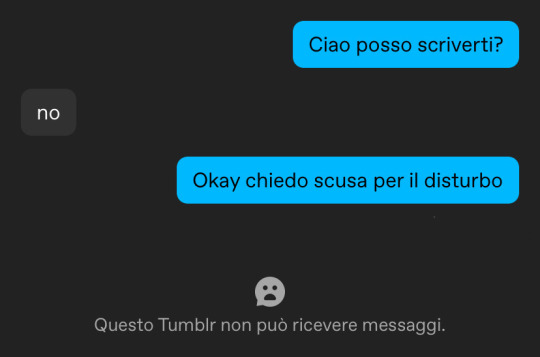
LupoSolitario00 🐺
74 notes
·
View notes
Text

#frasi#citazioni#frasi libri#citazioni di vita#frasi di vita#citazioni libri#amore#frasi belle#citazioni belle#frasi del giorno#poesie#napoletano#frasi napoletane#citazioni napoletane#poesie napoletane#frasi amore#citazioni amore#sentimenti#frasi sentimenti#citazioni sentimenti#frase del giorno
16 notes
·
View notes
Text
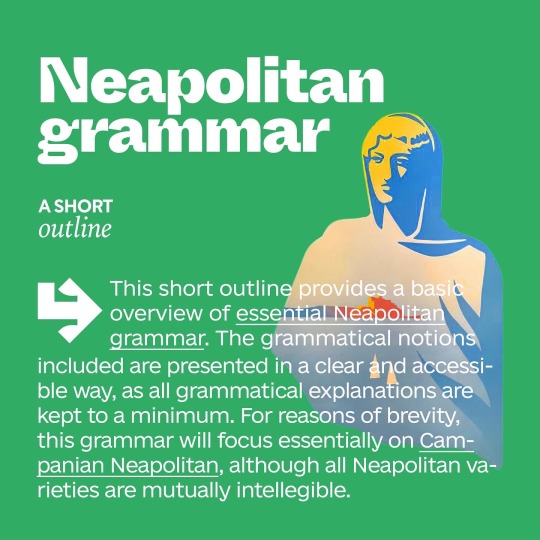
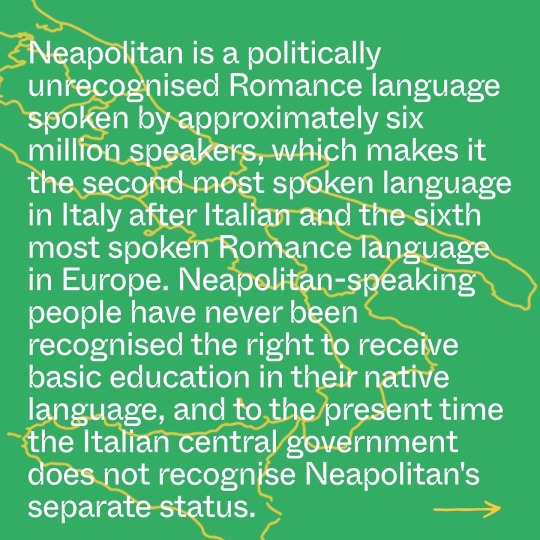


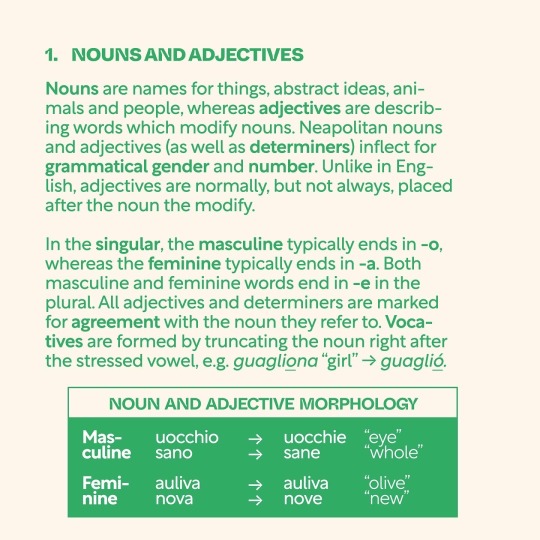
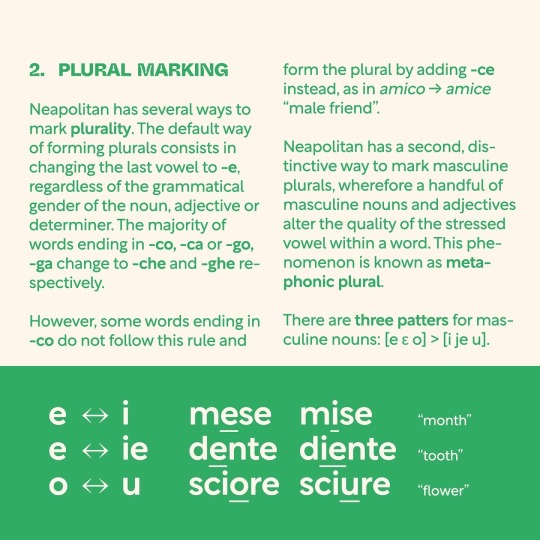
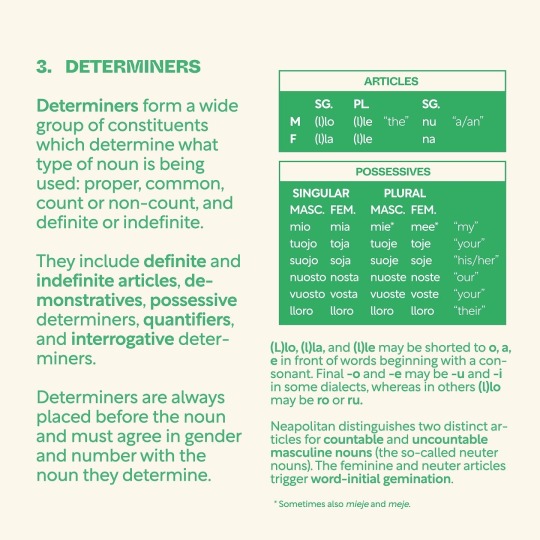
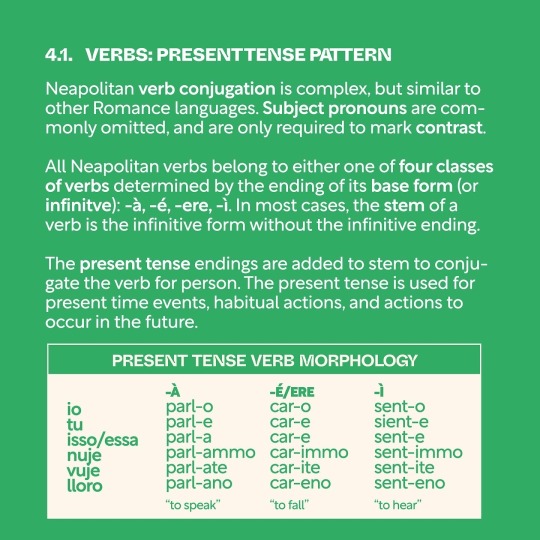


📗 A (very) SHORT OUTLINE of NEAPOLITAN GRAMMAR
🟢 Trying to condense Neapolitan grammar in a 10-picture Instagram post was HARD!!
🟢 There will be an ITALIAN and ENGLISH version of this post available for DOWNLOAD in PDF format for free!!
🟢 I will also post a LONGER and more DETAILED version of this grammar in TEXT format!!
Follow neapxita on Instagram 💚
113 notes
·
View notes
Text




12 notes
·
View notes
Text
I miei tre centesimi sulla questione Geolier a Sanremo.
1) Bello che per una volta si parli di napoletano, della necessità che abbiamo anche di scriverlo, e di scriverlo bene. Però se ci mettiamo a fare le pulci a Geolier perdiamo di vista il nocciolo della questione. È vero che nessuno sa scrivere in napoletano, però è anche colpa del fatto che quelli che lo sanno fare, non lo fanno e non lo insegnano.
Sono pure d'accordo col fatto di scrivere e diffondere una versione "corretta" del testo, ma non ha senso sommergere di critiche uno dei pochi artisti che negli ultimi anni ha rivendicato di parlare dialetto come scelta politica.
Che poi, versioni "corrette" del testo... Il napoletano è ormai lingua prevalentemente orale. Di standardizzazioni scritte ne esistono tante, con regole diverse.
Gira una versione del testo a firma di "neoborbonici" che hanno corretto il testo scrivendo "I' pe mme, tu pe tte".
Per me quell' i' è un obbrobrio. Io scriverei "Je pe' 'mme, tu pe' 'tte".
2) Il bello (e il brutto) dell'avere un dialetto che è ancora pienamente vitale come lingua è che evolve. È vero che il napoletano di Geolier è sguaiato e rionale, ma è il napoletano che si parla oggi. Io coi miei amici parlo così, non nella lingua di Edoardo, non in quella di Di Giacomo, men che meno in quella di Basile.
Certo, è un peccato che si vada "imbastardendo" molto con l'Italiano. Nella canzone, Geolier dice "t'amme" che in napoletano non esiste. Ci siamo ripetuti fino allo sfinimento che qua si dice "te voglie 'bbene", però obiettivamente "t'amme" le persone lo dicono sempre più spesso. È una parola che in napoletano prima non esisteva, che è stata "tradotta" dall'italiano e che probabilmente è il risultato del fatto che oggi, a differenza di 50 o 100 anni fa, quasi tutti i napoletanofoni parlano anche Italiano. Piaccia o no, è così che funziona la lingua.
3) Geolier frat'm.
Scritto così, male.
Così magari qualcuno fa un tweet anche contro di me.
16 notes
·
View notes
Text
"Generalmente, un dialetto è molto meno codificato di una lingua. Infatti, dei dialetti esistono numerose varianti, nessuna delle quali si impone sull’altra come “corretta” o preferibile; anche perché tutte le lingue vernacolari e i dialetti sono insofferenti alle regole, alle classificazioni, alle accademie ed alle grammatiche normative. In genere, non esiste nemmeno un sistema unico e standardizzato che permetta tutti di scriverlo allo stesso modo.
Se si cominciasse a insegnarlo a scuola (come hanno fatto in Spagna con il catalano, il gallego e il basco) si dovrebbe scegliere uno standard che costringerebbe le comunità di parlanti a utilizzare un unico codice scritto e orale. Cosa che a me, personalmente, non farebbe affatto piacere. Il dialetto è per sua natura anarchico e insofferente a briglie e regole fisse."
Questo scrivevo un paio di anni fa e questo credo ancora oggi, a prescindere (ma non troppo) dal caso geolier.
Aggiungo che Geolier non lo conosco, ma mi sta incuriosendo tutto questo parlare del suo napoletano scritto e orale; tuttavia, so bene che anche i rapper afroamericani scrivono spesso in un inglese difficilmente comprensibile da chi non conosce lo "Jive English" (U, B4, thru, Yo, what's crackin', homie? We chillin' on the block, keepin' it real, ya feel me?).
11 notes
·
View notes
Text
Ueee Napoletani dove siete? Consigliatemi pizzerie non buone ma top in centro❤️Thanks
18 notes
·
View notes
Text


E con questo direi che siamo ufficialmente a Napoli 😂
Napoletano? E famme 'na pizza! (cit.)
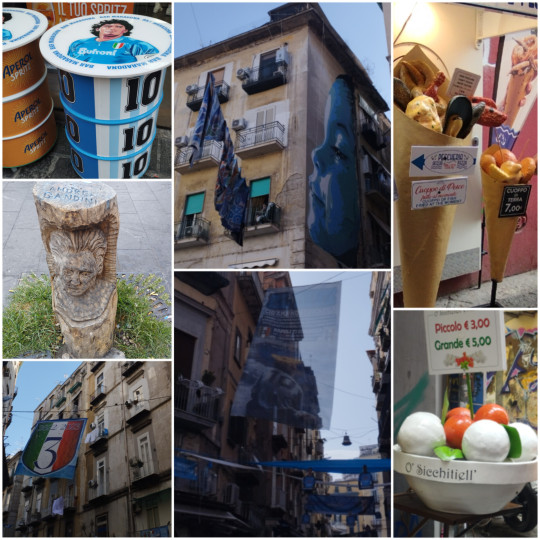
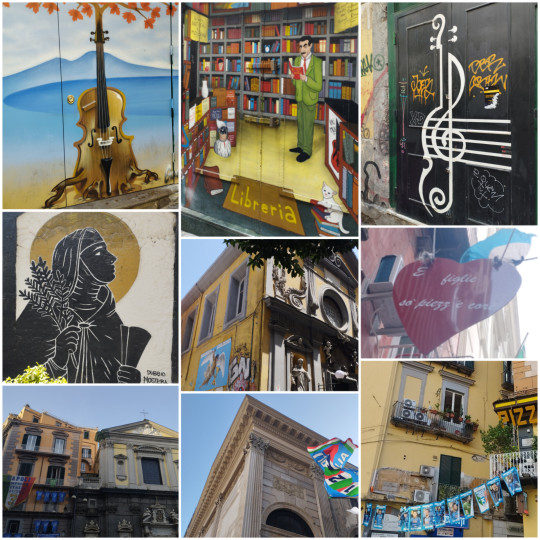
#pensieri per la testa#persa tra i miei pensieri#fotografia#foto#scatto fotografico#napoli#pizza#margherita#pizza margherita#vacanza#cit#Vincenzo Salemme#pizza fritta#vesuvio#per strada#arte di strada#festoni#napoletano#musica#scudetto#calcio#dialetto napoletano#stadio maradona#cibo tipico#cibo napoletano#maradona#cuoppo
9 notes
·
View notes
Text
Chi vò, pò.
Chi nun pò, nun vò!.
19 notes
·
View notes
Text
Secondo il concetto di "normalità", dovremmo svegliarci presto al mattino e dormire di notte. Ma sempre più persone, io compreso, trovano la magia nella notte. Sì, sono uno di quelli che preferiscono la tranquillità delle ore notturne per concentrarsi sul lavoro o per riflettere. La notte, con la sua quiete, è il mio momento migliore per essere creativo e trovare ispirazione, mi fa sentire molto più a mio agio e mi connette al me interiore.
D’estate, preferisco fare il bagno al mare di notte; è molto più romantico e magico. Adoro fare molte cose a notte fonda, come leggere e svolgere diverse attività. In fondo, mi sento un lupo nell’anima, pronto a esplorare la quiete e la bellezza della notte.
Ci sono molti miti sui nottambuli, alcuni dicevano che siamo più intelligenti o creativi. Non so se sia vero, ma di certo c'è qualcosa di speciale nella notte che ci attira.
Insomma, la notte è il mio momento. Quando tutti dormono, io sono più vivo che mai.
Purtroppo.. ora devo mettermi a dormire per svegliarmi presto l’indomani e ciò scoccia assai😮💨🐺.

LupoSolitario00🐺
25 notes
·
View notes
Text

#frasi#citazioni#frasi libri#citazioni di vita#frasi di vita#citazioni libri#amore#frasi belle#citazioni belle#frasi del giorno#napoletano#frasi napoletane#napoli#frasi amore#citazione amore#futuro#domani#aforismi italiani#blog italiani#citazioni italiane#frasi italiane#aforismi del giorno#citazioni del giorno#pensiero del giorno
75 notes
·
View notes
Text
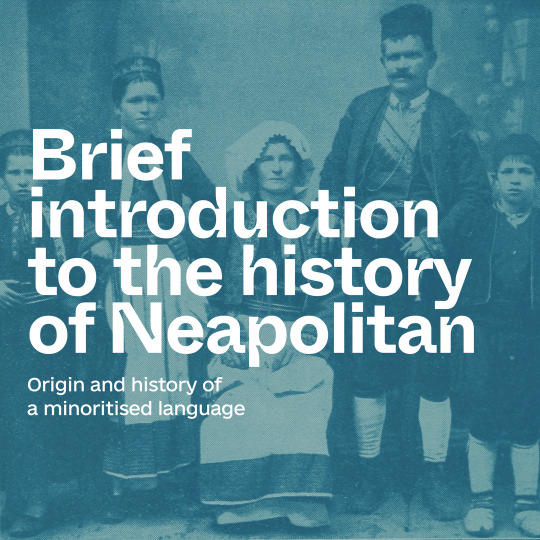
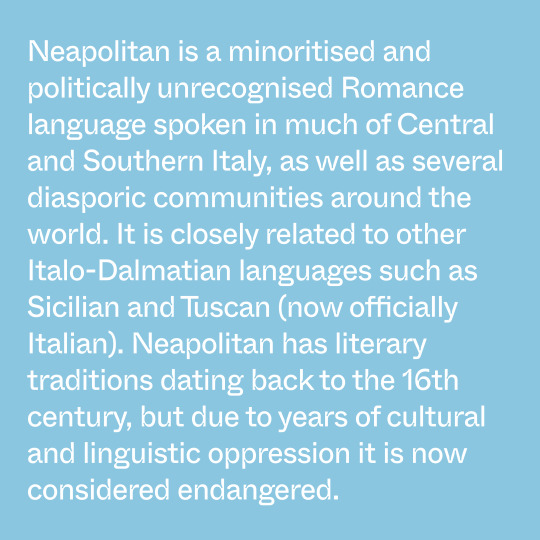

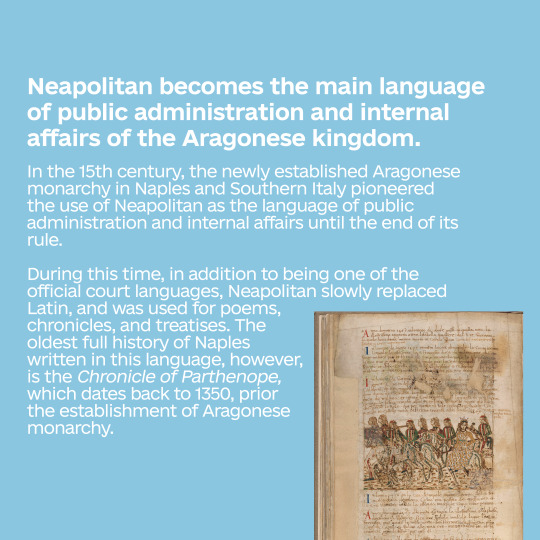
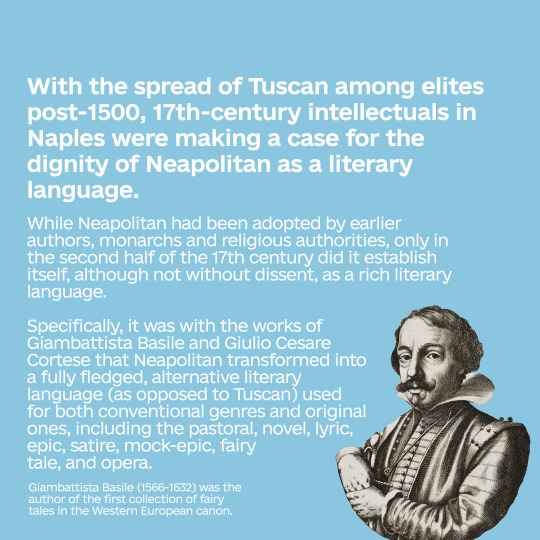
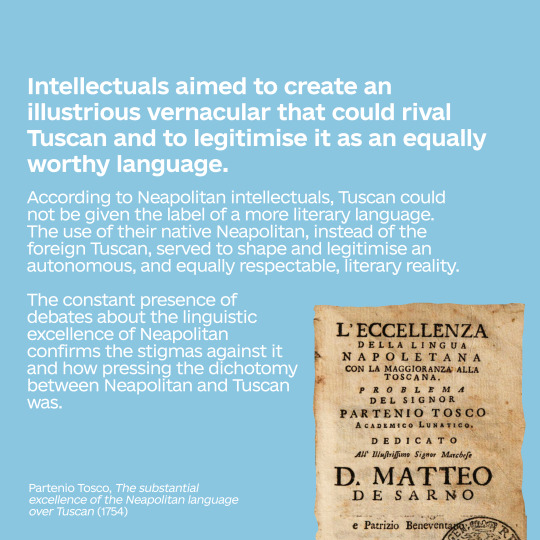
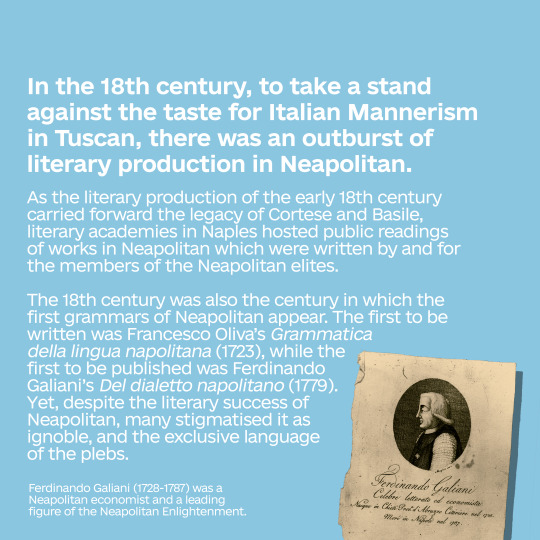



🔵 Brief introduction to the history of Neapolitan: Origin and history of a minoritised language (from @/neapxita on instagram)
✂️ alt text under the cut !!
10th century - Placiti Campani
The first written evidence of Neapolitan dates back to the 10th century, when four sworn declarations were composed in modern-day Campania. Despite the brevity and formulaic nature of the texts, the Placiti campani provide an invaluable early example of the vernacular spoken in Campania, and allegedly the first one in the Italian peninsula.
15th century - Aragonese Court
Neapolitan becomes the main language of public administration and internal affairs of the Aragonese kingdom.
In the 15th century, the newly established Aragonese monarchy in Naples and Southern Italy pioneered the use of Neapolitan as the language of public administration and internal affairs until the end of its rule.
In the 15th century, the newly established Aragonese monarchy in Naples and Southern Italy pioneered the use of Neapolitan as the language of public administration and internal affairs until the end of its rule.
During this time, in addition to being one of the official court languages, Neapolitan slowly replaced Latin, and was used for poems, chronicles, and treatises. The oldest full history of Naples written in this language, however, is the Chronicle of Parthenope, which dates back to 1350, prior the establishment of Aragonese monarchy.
17th century - I
With the spread of Tuscan among elites post-1500, 17th-century intellectuals in Naples were making a case for the dignity of Neapolitan as a literary language.
While Neapolitan had been adopted by earlier authors, monarchs and religious authorities, only in the second half of the 17th century did it establish itself, although not without dissent, as a rich literary language.
Specifically, it is with the works of Giambattista Basile and Giulio Cesare Cortese that Neapolitan transformed into a fully fledged, alternative literary language (as opposed to Tuscan) used for both conventional genres and original ones, including the pastoral, novel, lyric, epic, satire, mock-epic, fairy tale, and opera.
17th century - II
Intellectuals aimed to create an illustrious vernacular that could rival Tuscan and to legitimise it as an equally worthy language.
According to Neapolitan intellectuals, Tuscan could not be given the label of a more literary language. The use of their native Neapolitan, instead of the foreign Tuscan, served to shape and legitimise an autonomous, and equally respectable, literary reality.
18th century
In the 18th century, to take a stand against the taste for Italian Mannerism in Tuscan, there was an outburst of literary production in Neapolitan.
As the literary production of the early 18th century carried forward the legacy of Cortese and Basile, literary academies in Naples hosted public readings of works in Neapolitan which were written by and for the members of the Neapolitan elites.
The 18th century was also the time in which the first grammars of Neapolitan appeared. The first to be written was Francesco Oliva’s Grammatica della lingua napolitana (1723), while the first to be published was Ferdinando Galiani’s Del dialetto napolitano (1779). Yet, despite the literary success of Neapolitan, many stigmatised it as ignoble, and the exclusive language of the plebs.
Ferdinando Galiani
For Galiani, Neapolitan was not just the language of the populace, but the cultural property of the nation.
“Therefore we do not despair yet (...) Perhaps one day our dialect will achieve the most unexpected fortune: we will defend our causes in this language, pronounce our decrees, promulgate our laws, write our annals, and do everything that the patriotic zeal of the Venetians has allowed them to do in their own harmonious dialect”.
19th century - Music
Neapolitan and Neapolitan-language music have a rich and long-standing tradition.
The earliest mention of the performance of villanellas coincides with the visit of king Charles V (or Charles II of Spain) to Naples between 1535 and 1536. The first anonymous collection of villanellas was published shortly after.
After the king’s visit, villanellas, which were sung in Neapolitan, acquired clear political undertones and became representative of Neapolitans’ national identity in the 16th century.
However, the song fest of Piererotta marks a turning point in Neapolitan music history. Starting officially in 1835, the festival constituted a major festivity attracting tourists from both within and outside the kingdom.
1861 and Fascism
At the moment of the unification of Italy in 1861, less than 2,5% of the population was able to use Italian.
Much like Latin in the previous centuries, Italian was an exclusively written and literary language known only to a minority of literate people.
The appearance of the first bilingual dictionaries immediately before and after the unification confirms that Neapolitan was not only the language of the common people but also that of the literate.
In the aftermath of the unification, these dictionaries were used to help students who were monolingual in Neapolitan to learn Italian, the language of the new state.
In the 20th century, the nationalist agenda of the fascist regime suppressed the use of all minority languages and enforced the use of Italian in its stead, especially at school. Children were beaten or otherwise punished, generating fear and shame towards their native languages.
Since then, Neapolitan has continued to be spoken, sung and written, albeit without being taught nor recognised by the Italian state, often coexisting in a situation of dangerous diglossia.
#neapolitan#napulitano#napoletano#romance languages#minority languages#minoritised languages#napoli#south italy#italy#campania#naples
204 notes
·
View notes
Text
youtube
2 notes
·
View notes
Text
Le fenditure della medusa dalla bocca rossa
Versi perversi italonapoletani
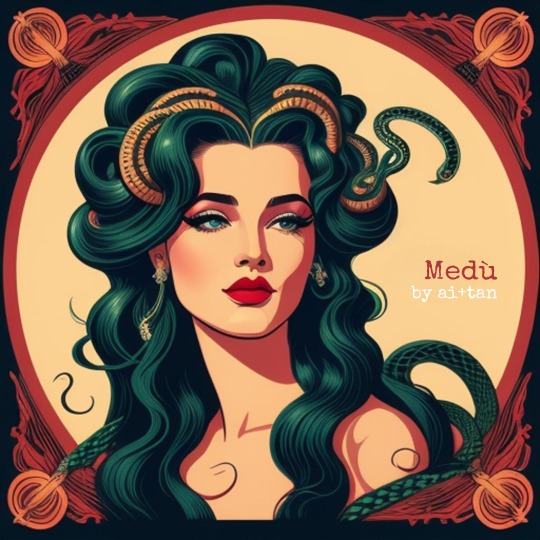
4 notes
·
View notes
Text
So' cuntento ca staje bon pecché a te fá stá bon nun songo in grado
Scusame si parlo e cchiù quando sto zitto
Dimme si me pienze almeno quanno te scite cu chillo
Ij e te 'nzieme pareva nu film
Ma è fernuta comme 'int'a nu film.
- Chiagne, Geolier
21 notes
·
View notes
